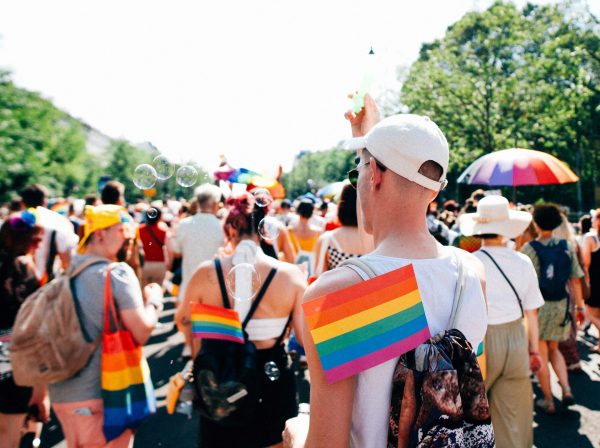On June 26th, 2015, same-sex marriage was federally legalized. (It should be noted, firstly, that same-sex marriage is largely known by the term ‘gay marriage,’ which is a misnomer, considering not all gay relationships are same-sex and not all same-sex relationships are gay.) While Queer folk everywhere celebrated this long fight for victory, there has been a wealth of valid critique from Queer folk as well. In order to critique the social institution that is marriage (and social application of it), one of my own concerns exists within the larger sphere of capitalism.
Beginning on that date in June, Facebook created an option–a hint-hint-nudge-nudge kind of suggestion, really–for profile pictures to be converted into having a translucent rainbow overlay. It was a celebratory gesture; there was also a socially coercive aspect to apply the change lest one be considered not in support of gay marriage after pretty much everyone on your friend’s list has done so. While the logic behind Facebook’s rainbows could very well be one of pride, it is also clearly an opportunity to create better Public Relations for the site. Facebook has come under fire multiple times for allowing all sorts of Queerphobic (and racist, and pro-ableism, and in defense of, for one example, Darren Wilson–the officer who shot Michael Brown–and so on) pages to remain active without batting an eye towards endless reports of harassment. Facebook also faced a backlash when the website decided that everyone must use their given name if they want to access the site, a move harmful to trans* folk and putting survivors of abuse or harassment trying to safely use the internet at high risk. Why then, when Facebook allows pages dedicated to promotion and defense of Queerphobic and other kinds of social violence to continue existing on the website, would rainbow profile pictures be perceived as true support of gay (not Queer, specifically gay and lesbian) pride? The cognitive dissonance is breathtaking, yet Facebook is applauded for instituting this new profile option.
Similar critiques were made by Third-Wave Feminists in the ’90s regarding ‘Girl Power’ magazine adverts and television commercials; were they truly effective, or just a new way to cash in on a shift in the cultural zeitgeist? Is Campbell’s Soup, for example, being inclusive with its new commercial, or using an exploitive new means of promotion and PR based off of the new federal legalization of gay marriage? (But my goodness, the ad is absolutely adorable!) In all honesty, just as Third-Wave Feminist critiques of the at-the-time new capitalistic interest in promoting ‘Girl Power,’ it can certainly be both. ‘Girl Power’ was, to an extent, being used as product promotion and ‘progressive’ public relations; but regardless, young girls and women were seeing themselves reflected in areas they were previously rendered valueless–which is a good thing, cash cow or not. The same conclusion, I believe, can and perhaps should be applied to ‘gay’ marriage and growing cultural acceptance of Queer Pride.
Unfortunately, potential cash cows will be grasped and milked for all they are worth by Capitalism as a concept and practice. Using pride as a PR strategy, after federal legalization, was inevitable despite the heavy backlash from anti-Queer rights supporters. While it certainly feels exploitive much of the time, Queer folk are seeing themselves in media as more than the Token gay BFF; commercials like Campbell’s have zero emphases on the ‘queer-factor’ and primary focus of the ad is still the marketing of their product, not necessarily marketing ‘acceptance,’ though it comes very close. ‘Marketing Acceptance’ remains a form of tokenism; a frivolous way of saying “support this company, because we support ‘The Gays.'” Cashing in on peoples’ life experiences can be despicable, but there is always the glimmer of hope that what begins as exploitive PR can morph into visibility.





